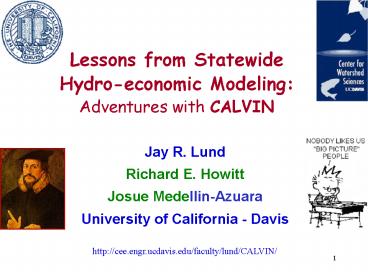Lessons from Statewide Hydroeconomic Modeling: Adventures with CALVIN - PowerPoint PPT Presentation
1 / 16
Title:
Lessons from Statewide Hydroeconomic Modeling: Adventures with CALVIN
Description:
Integrated water management, water markets, capacity expansion ... Expansions of selected conveyance and aquifer recharges are beneficial ... – PowerPoint PPT presentation
Number of Views:129
Avg rating:3.0/5.0
Title: Lessons from Statewide Hydroeconomic Modeling: Adventures with CALVIN
1
Lessons from Statewide Hydro-economic Modeling
Adventures with CALVIN
Jay R. Lund Richard E. Howitt Josue
Medellin-Azuara University of California -
Davis
http//cee.engr.ucdavis.edu/faculty/lund/CALVIN/
2
Real work done by
- Dr. Mimi Jenkins Dr. Josue Medellin
- Dr. Andrew J. Draper Dr. Kenneth W. Kirby
- Dr. Stacy K. Tanaka Prof. Manuel Pulido
- Matthew D. Davis Dr. Siwa M. Msangi
- Brian J. Van Lienden Sarah Null
- Brad D. Newlin Randall Ritzema
- Melanie Taubert Prof. Guilherme Marques
- Dr. Tingju Zhu Dr. Arnaud Reynaud
- Kristen B. Ward Pia M. Grimes
- Dr. Inês Ferreira Marcelo Olivares
- Mark Leu Jennifer L. Cordua
- Matthew Ellis Kaveh Madani
- Rachael Hersh-Burdick Christina Connell
http//cee.engr.ucdavis.edu/faculty/lund/CALVIN/
3
More Thanks
- USACE Hydrologic Engineering Center - Bob Carl,
Mike Burnham, Darryl Davis for HEC-PRM
optimization code - Many agencies who gave us data and helped us
better understand it Dozens of people who went
out of their way - Advisory Committee, chaired by Anthony Saracino
for helping us communicate approach and results
4
till More Thank
- Cal. Resources Agency - Douglas Wheeler
- Department of Water Resources
- Henry Vauxs connections
- CALFED Mark Cowin
- CEC Guido Franco
- USBR
- CALEPA Ricardo Martinez
- PPIC
- TNC
5
What is CALVIN?
- Entire inter-tied California water system
- Surface and groundwater systems
- Supply and demand management options
- Economics-driven engineering optimization model
- Economic Values for Agricultural, Urban,
Hydropower Uses - Constraints for Environmental Uses and Flows
- Prescribes monthly system operation over a
72-year representative hydrology - Forces quantitative understanding of integrated
water and economic system
6
Californias Water System
155 Major surface reservoirs Extensive
groundwater Vast conveyance network Vast
irrigated acreage 36 million people
7
Data Flow for the CALVIN Model
8
Agricultural Water Values (SWAP)
8
9
Local Statewide Activities
- Local Activities
- - Groundwater use and recharge
- - Surface reservoir operations
- - Local water markets and exchanges
- - Water use efficiency improvements
- - Wastewater reuse
- - Desalination
- Statewide Activities
- - Inter-regional water conveyance
- - Surface reservoir operations
- - Water conservation incentives
- - Groundwater banking and recharge
- - Water market support and conveyance
- - Wastewater reuse subsidies
Integrating mix of responses is important
portfolio planning.
10
Purposes of CALVIN
- Economic-engineering optimization of regional and
California-wide water supply - User targets
- Research
- Student education
- Educate California water modeling community
- Databases and documentation
- Large-scale optimization
- Integrated water management portfolio planning
- Integrating economics and engineering
- Trouble-making?
11
Some CALVIN Study Results
12
Does CALVIN work?
- Intertie between Contra Costa and East Bay
(CCWD-EBMUD) - Water markets and transfers
- Imperial Irrigation District and the South Coast
- State Water Project and Castaic-Antelope
- Sacramento Valley
- Conjunctive use is active
- Small value of expanded storage
13
Limitations
- Chapter 5 of 2001 report, on web
- Data problems
- Limits of network flow formulation
- Too smart perfect hydrologic foresight
- Lack of companion simulation model
- Never finished (interface, data, software, )
14
Model Development Lessons
- Build around a few desired features Attempting
everything leads to nothing - Have an integrated workable technical plan
- Organize input data in databases
- Document in databases
- Better data quality documentation is needed
- Scientific information is often inconvenient for
current policy discussions
15
Water Management Lessons
- Hydro-economic modeling is possible, and improves
understanding and policy insights. - Physical and economic flexibility exists
- Not water shortage, but a shortage of cheap water
- The Sacramento - San Joaquin Delta is the weakest
link in the network
16
Water Management Lessons
- Portfolio solutions tend to be cost effective and
robust - Water markets, conservation, groundwater banking,
reuse - Expansions of selected conveyance and aquifer
recharges are beneficial - Higher expectations for quantitative information
are reasonable - More adventures to come!































